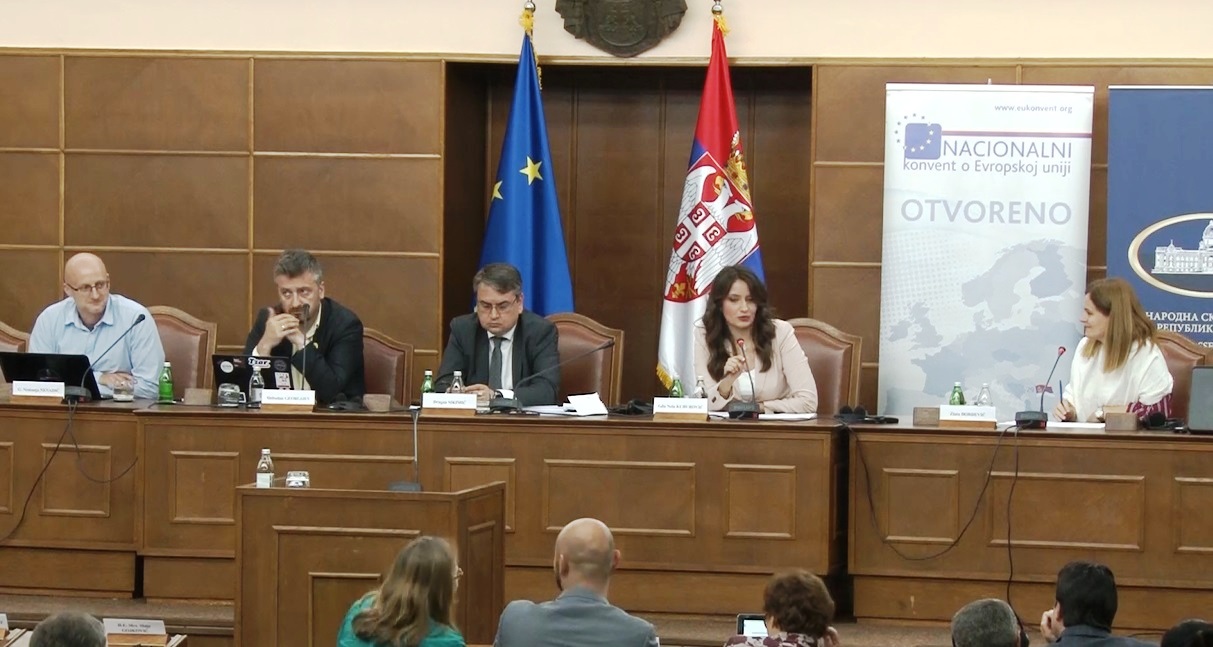National Convention on the European Union, Chapter 5 Working Group - Public Procurement and Public-Private Partnerships
Public procurement is an important segment of the functioning of the economy, due to the fact that they significantly participate in the gross national product of most countries in the modern world. The organization of the public procurement system therefore has a great impact on ensuring the principle of free competition, if that system is not set on rules that discriminate between economic operators according to the country of origin or other irrelevant criteria.
The EU acquis on public procurement is based on the principles of transparency, equal treatment, free competition and non-discrimination. In addition, there are specific EU rules that apply to coordination in the selection of the most favorable tenderer and the award of public contracts for works, services and goods. Special rules also apply to individual sectors. The acquis also contains rules on how decisions of public sector bodies are reviewed and given the possibility of remedies. These rules also require the existence of specialized bodies to ensure their implementation.
The procedure prior to the award decision is governed by Directive 2014/24 / EU on so-called "traditional contracting authorities" ("classic sector") and Directive 2014/25 / EU on bodies and entities operating in the water, energy and transport sectors. and postal services ("utility sector"). In addition, Directive 2009/81 / EC stipulates that the procedures for the award of certain works contracts, supply and service contracts are coordinated by contracting authorities or entities in the field of defense and security. EU regulations also regulate the issue of electronic procurement, which includes electronic means of communication, dynamic purchasing systems and electronic auctions. The rules also provide for a Common Procurement Vocabulary, as well as standard forms for publication.
In addition to public procurement procedures, the public procurement system in the EU in a broader sense consists of procedures for concluding concessions and other forms of public-private partnership. Directive 2014/23 / EU of the European Parliament and of the Council on the award of concession contracts defines for the first time clear and unambiguous rules for the award of concession contracts at EU level.
EU member states had until 18 April 2016 to transpose these directives into national law. In general, the aim of the current directives compared to the previous ones was to simplify the procurement procedure and make it more flexible. Among the new rules is the unique electronic proof of eligibility for bidders (ESPD), which, through the digitization of public procurement, can significantly increase the efficiency of the system (only the company that wins the tender submits the entire documentation). The new rules limit the requirements placed on bidders in terms of previous turnover, which favors the possibility for smaller companies to participate in procurement. Rules on the division of procurement into lots should have a similar effect. The possibility of public procurement to serve as a means of implementing public policies, especially in the field of environmental protection, social integration and innovation, is also emphasized.
In order to comply with public procurement directives, states need to have adequate administrative capacity to implement them. These capacities should be sufficient to ensure the functioning of the public procurement system, the creation of public policies in this area, the functioning of operational resources, support services, monitoring and statistics, as well as harmonized controls for all areas related to public procurement. Capacities should exist not only with state bodies that have competencies in the field of public procurement, but also with the main procuring entities at all levels of government, because they should effectively enforce public procurement rules.
The acquis also contains rules on redress and remedies in public procurement procedures. State authorities should ensure the implementation of adopted regulations and an effective system of legal protection in cases when the rights of participants in public procurement procedures are endangered.
Given the development of the public procurement system since 2002, which was largely based on monitoring EU standards, Serbia was invited to submit a negotiating position without criteria for opening a chapter.
What is the benefit and result for Serbia?
Improving the public procurement system in the context of EU accession, if the potentials of the accession process are used in the best way, will enable Serbia to save public funds through free bidding of bidders for public sector contracts, economic growth and development of open market businesses in Serbia. and the EU, using standard procedures, learning from the experiences of EU member states and other candidates for accession and strengthening the system for preventing corruption and combating other irregularities in public procurement and public - private partnerships.
In Serbian:
Radni sastanak Nacionalnog konventa za EU – grupa za poglavlje 5 (24. januara 2020)

Sedma plenarna sednica Nacionalnog konventa o Evropskoj uniji i panel o korupciji (10. jun 2019)
Kompletan video snimak panela dostupan je ovde.

Materijal:
- Inicijativa - odlaganje primene novog Zakona o javnim nabavkama (maj 2020)
- sumiran pregled situacije u 2018 i prioriteti u oblasti javnih nabavki i jpp za 2019
There are no articles in this category. If subcategories display on this page, they may have articles.


















